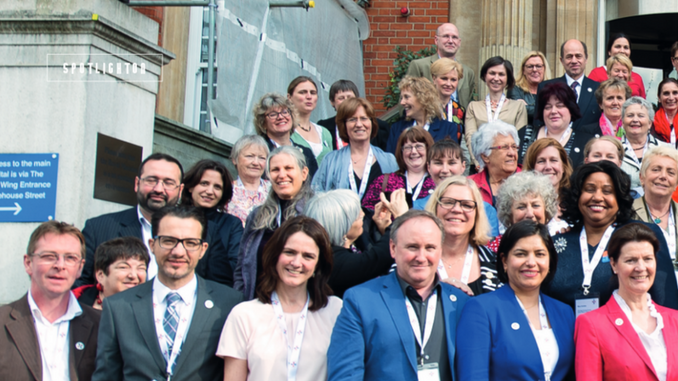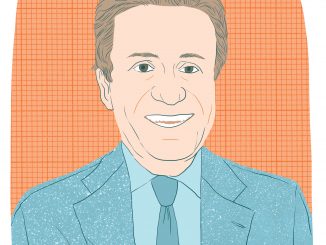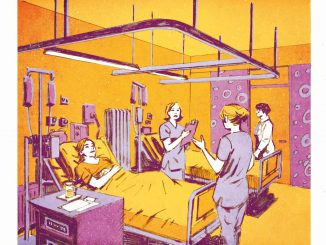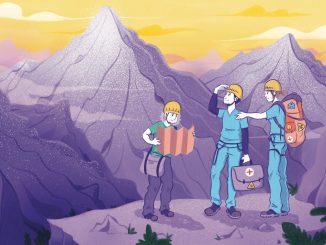
When key figures in European cancer nursing gathered at the Royal Marsden to mark 30 years of EONS, they found they had a lot to celebrate and a lot more work to do.
All people affected by cancer across Europe will benefit from the care of well-educated, well-informed and highly competent cancer nurses, who will play a central role in providing support, promoting health and improving clinical outcomes.” Such is the vision of the European Oncology Nursing Society. Though it remains far from being realised, in many countries the role of specialist nurses in planning, delivering and also researching cancer care has been transformed since EONS was founded in 1984.
To celebrate its first 30 years, and plan how to build on its achievements, EONS held an anniversary event in April. One hundred people were on the invitation list, including 10 past presidents, who between them offered a wonderful insight, through a series of interviews conducted by BBC reporter Nick Owen, into how the fledgling nursing society developed.
“EONS has become the voice of cancer nursing,” EONS President Erik van Muilekom told the assembled guests. “We should be proud of what we have achieved, but need to continue to improve European cooperation to further the professional development of cancer nurses.”
It was particularly apt, he said, that the anniversary event was being held at the Royal Marsden Hospital, London, since it was here that EONS set up its first office when it was founded in 1984 as the Fellowship of European Oncology Nursing Societies.
The idea of forming a society linking cancer nurses working across Europe was first mooted at the 2nd European Conference on Clinical Oncology and Cancer Nursing, held in Amsterdam in November 1983, recalled Rosette Poletti, a Swiss cancer nurse who became EONS’ first chairperson in 1984. “At cancer meetings we were never in charge, just invited. In Amsterdam we networked and decided we should take things into our own hands and form a nursing society,” she said.
From the outset EONS looked to reposition the role of cancer nurses on the grounds that nurses have the most sustained involvement with the care of patients and should have equal status in multidisciplinary care. It also wanted to provide cancer nurses with a sense of community.
Robert Tiffany, who was appointed the first President of EONS in 1985, is widely acknowledged as a driving force behind the creation of the society. Working at the Royal Marsden in the late 1970s, Tiffany had pioneered the concept of clinical nurse specialists in oncology and helped set up the first oncology nursing courses. He firmly believed that cancer patients had the right to be nursed by a highly qualified skilled work force. “The thing Bob did was to take nurses internationally and get them to work together in a collaborative way that meant the whole was bigger than the sum of the parts,” said Shelley Dolan, the current Chief Nurse at the Royal Marsden. Sadly Tiffany, who was universally acknowledged as the world’s leading cancer nurse, died in 1993 aged 50.
Today EONS has matured into a dynamic organisation with 23,000 members from 33 oncology nursing societies spread across 31 different countries, offering a unique platform for national cancer nursing societies to present a united voice. The latest recruit to the EONS family is Palestine, who joined the organisation in February this year.
Realising the vision
For EONS, education has always been the key to developing specialist cancer nurses, and getting recognition for their role and status. The EONS Cancer Nursing Curriculum, now in its 4th edition, has helped to create an international education framework for cancer nurses. The curriculum provides the essential scientific, psychological and sociological information nurses need to provide care that minimises the trauma of cancer, and maximises outcomes for patients and their families. It is flexible in design so that nurses can adapt the framework for their own country and professional circumstances.
More specific European curricula have also been developed for nurses working with breast cancer, lung cancer and older patients, and for nurses seeking to develop skill and knowledge in the assessment and management of particularly serious or troubling side-effects. The TITAN project, for instance, covers thrombocytopenia, anaemia and neutropenia. An annual Masterclass, run jointly with the European School of Oncology, offers advanced nurses the opportunity to learn alongside clinical oncologists on a week-long full-immersion multiprofessional course. The opportunity the event brings to raise awareness among the doctors of the untapped potential of cancer nurses is an added bonus.
To get the best possible patient benefit from specialist nursing care requires research to develop a strong evidence base, so supporting nurse-led research, is another key plank of EONS’ work. EONS research grants allow nurses to carry out significant research projects, while travel grants enable them to spend time in other countries to build collaborations and facilitate research proposals. Cancer nurses can also attend one of the research proposal workshops run by the society to help them develop their confidence and skills in what can be a highly complex and competitive task. Research results are presented at EONS’ own scientific conference and at the nursing track of ECCO, the European Cancer Congress, which take place on alternate years.
Perhaps the most important requirement for realising the true potential of specialist cancer nursing, however, is still effecting a change in attitudes within the medical establishment – this is more of an issue in some countries than in others. Advocacy therefore remains an important part of EONS’ work. The society’s status as a founding member of the Federation of European Cancer Societies, now morphed into ECCO, is important here, as is pressure exerted by its member organisations at a national level.
Looking ahead
Looking to the next phase of the society’s development, president-elect Daniel Kelly told the meeting that Europe faces many challenges regarding cancer, including ageing populations, cancer patients with multiple comorbidities, fast-changing treatments and more health-literate patients. In the future, many oncology nurses are likely to find themselves working in community settings away from specialist centres. “EONS is going to have to think about how we manage the growing complexity. We are going to have to consider how we support nurses who are making decisions with patients, rather than for patients,” said Kelly.
He highlighted the challenges that remain across Europe in having cancer nursing recognised as a specialty in its own right. “In some countries you need a specialist qualification to become an oncology nurse, whereas in others cancer nurses learn on the job; in some countries there are nurse-led services, whereas in others nurses are expected to carry out specific tasks,” he said. EONS aims to give members the confidence to see themselves as valuable members of the multidisciplinary team, he added. “We want to ensure that cancer nursing is recognised throughout Europe as a specialty with its own qualifications and training.”
Ultimately, said Kelly, EONS would like to lobby for an equal standard of oncology nursing education across Europe that would deliver parity in terms of certification, and allow nurses to work across European borders.
“As an organisation EONS has always been flexible and innovative,” he said. “We need to continue to evolve in order to survive in the changing world of cancer care.”
EONS in the words of the presidents
Rosette Poletti:
First chairperson
“It all started much earlier than 1984. As oncology nurses, many of us were invited to meetings, but were never in charge. At the 2nd European Conference on Clinical Oncology and Cancer Nursing, held in Amsterdam in November 1983, there were many nurses from different countries who networked and decided to take things into our own hands. We asked for a room, had a meeting and decided to create something that would be a nursing society for oncology nurses. I took charge for a year, then in 1985 I said to Bob Tiffany, ‘You’re the one who’s at the centre, you should be president.’ EONS became something that changed the lives of many nurses around the world.”
Elisabeth Holter:
President 1988–1990
“Robert Tiffany, the first president of EONS, was very inspiring enthusiastic and impressive. He was a celebrity, a star who was known all over the world and had a lot of charisma. In the first few years of EONS all the work was about professional development, and establishing nursing research.”
Hansruedi Stoll:
President 1991–1993
“The highlight of my presidency was when I signed the European Cancer Societies’ curriculum on cancer nursing. Here a group of cancer nurses from EONS produced a curriculum intended to be the standard of teaching cancer nursing throughout Europe. The saddest moment of my presidency was when Bob Tiffany died.”
Kathy Redmond:
President 1994–1997
“I think EONS inspired cancer nurses. It gave them a vision of how they could contribute to cancer outcomes and be proud of that. The status of nursing across Europe at that time was very diverse. Some nurses were seen as low-level workers whose contribution was not respected. This has changed dramatically – EONS has helped to give nurses confidence that they have a contribution to make.
“As EONS president, I managed to leverage my Irish connection to lobby the then EU Commissioner for Health, Pádraig Flynn, to secure a seat for cancer nurses on the Europe Against Cancer committee. My involvement at European level also helped me recognise that Irish cancer services needed improvement, and I was pleased to be appointed as a nurse to the first Irish National Cancer Forum, which led to fundamental changes in cancer services in Ireland and improved cancer outcomes.”
Nora Kearney:
President 1997–1999
“I signed the agreement for the first Masterclass with the European School of Oncology, based on the collaboration that Kathy had established. I was the first President Elect, so I was aware what the work would be like. It was very challenging. I remember for two months being in two different countries every week, and having to maintain my hospital work. What made it possible were the people you met on the journey. The experience of EONS is something that I’d recommend to everyone. It stretches your ability to work at a very high European level politically and professionally. It was an amazing time.”
Agnes Glaus:
President 1999–2001
“I was involved in teaching on the first European Oncology Masterclasses, which gave us a platform as nurses to teach other health professionals. We used the slogan ‘learning to care’, which I liked because it encouraged people to be curious and learn together at different levels. The Masterclasses were the start of a new way of professionalism for nurses.”
Giel Vaessen:
President 2001–2003
“We developed excellent teaching models and workshops. The challenge was to encourage people to go back to their own countries and teach their colleagues.”
Yvonne Wengström:
President 2005–2007
“At the time of my presidency the use of endocrine treatment in breast cancer was increased from two to five years. We realised that there was a need for new information for patients around treatment and side-effects, which led to more intense collaborations with patient groups across Europe. We developed models to support nurses working in different countries. “During my presidency the society had undergone a real growth spurt and I was receiving 150 emails a day. When EONS was 20 we realised that we had to build the infrastructure and appointed the first executive director.”
Sultan Kav:
President 2009–2011
“In my presidency we developed working groups under the CARE strategy involving communication, advocacy, research, and education. The main idea was to engage more with our members.”
Sara Faithfull:
President 2007–2009
“I identified that men with prostate cancer were a big group who didn’t have nursing support. We undertook a survey of around 1000 patients to find out about the areas where patients felt they needed more support, and talked to nurses. We discovered a disconnect. The nurses wanted more technical expertise, while patients were saying they wanted more psychological and symptom management support. We found that when nurses were well informed symptoms were well managed, but if nurses were poorly informed it was worse than having no nursing care at all! “When UK charity laws changed we had to do work around the membership requirements to put in place a more professional organisation. This was the time that the website was created, and the online learning resources established.”
Birgitte Grube:
President 2011–2013
“At ECCO 2013 in Amsterdam we celebrated our birthday and invited all the presidents from the other organisations, including ESMO, ESTRO and ESSO, to come to our session. We now hope to collaborate with them in a multiprofessional way to develop educational initiatives at the EU level. “The whole structure, organisation and administration of EONS works really well now and we’re on top of the work. Being president of EONS is the best thing that I have ever done. It is such a huge experience and you learn so much from it, but it uses up all your spare time and more.”





